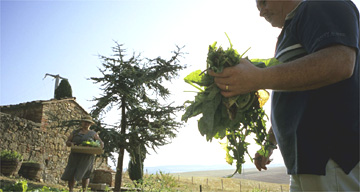
When I tell people that I spent three months travelling around some of the most beautiful parts of Italy for less than £100, they tend not to believe me. But as well asthat, I ate the sort of food that London's finest restaurants charge a king's ransom for, learnt skills that will stay with me for life, and came home fitter than I have ever been.
And some people manage it for far longer than three months. During my time in Tuscany, I met an Irishman, a former advertising mogul, who'd signed up for three weeks and was still going strong ayear later.
Other people, from backpackers to retired schoolteachers, hadn't restricted their Wwoofing to Italy, they had Wwoofed right across Europe. The premise is simple. 25 buys you membership to WWOOF Italy, or Willing Workers on Organic Farms. For that you gain access to a list of several hundred farms and small holdings, andare provided with basic insurance cover.
Once you've got the list, you sift through it and decide whether you want to pick olives, learn how to keep bees, harvest medicinal herbs, grow vegetables, work with livestock, or make soap and essential oils. The possibilities are endless. In return for six hours' work a day, five days a week, you get food and accommodation, and the chance to experience an Italy far off the beaten track.
Only two weeks after finding the wwoof.it website on the internet, I was planting tomatoes in the Tuscan hills. It was the kind of Italy I'd read about in Patience Gray's Honey From A Weed:a world of ancient rhythms andbenevolent sunlight. Away from Tuscany'stourist centres, one finds aregion largely unchanged by modernity. Here, olive trees are pruned by hand, the morning milk arrives still warm in a pail, and the meadows are a blaze of wild flowers: irises, crocuses and poppies, many species of which have vanished elsewhere thanks to the perils of industrial agriculture.
The first farm I worked on, near the medieval hill town of Castagneto Carducci, was probably my favourite. Owned by a Swiss-German couple, it was composed of 30 acres, a ramshackle farmhouse and, in its own small valley, acaravan - replete with two small bedsand a lantern: our accommodation.
On this farm, I learnt how to make tinctures from wild echinacea, and tried my hand at keeping bees. My hosts were invariably patient while instructing the most basic agricultural techniques to a greenhorn. In my three months in Italy, I worked on four different farms. In each of them, the hard work was balanced out by a kind of food I'd rarely experienced before. Thick cannellini bean soups with chilli oil and parmesan shavings. Pasta made from farro, a traditional Tuscan grain.
Schiacciata, aflat-bread pizza baked without toppings other than salt and green olive oil. My favourite, castagnaccio, asmoky chestnut flour cake, best enjoyed with fresh sheep's milk ricotta and honey. Returning home, my taste buds reacted poorly to reverting to a staple English diet. My hands felt too clean without their covering of soil. Within a month, I'd applied for an allotment, and within two had tomatoes growing of my own. At only 300 square yards, and in the depths of Boston Manor, west London, my only regret is that it's not quite big enough to accommodate Wwoofers.
Piers Moore Ede's book, Honey And Dust, is published by Bloomsbury at £14.99. ●London to Pisa by rail via Paris and Florence from £117 (voyagesncf.com).

